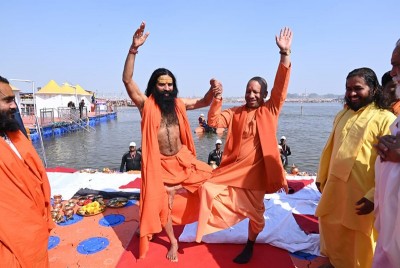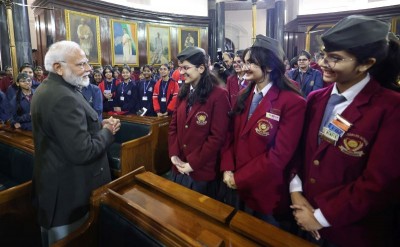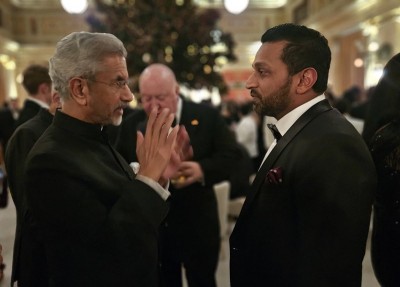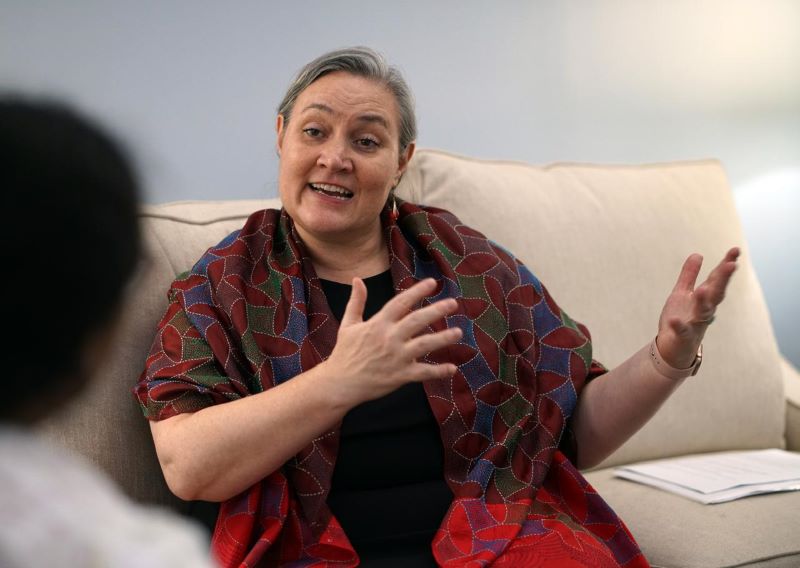 India-U.S.
India-U.S.
Indian students eying US education should evaluate the return on investment : Outgoing Consul General in Kolkata Melinda Pavek
U.S. Consulate General in Kolkata Melinda Pavek, whose warm, often informal, socio-cultural engagement endeared her to a cross section of people in the eastern region, is set to depart from this part of India soon. Ahead of her departure, IBNS correspondent Souvik Ghosh speaks to Pavek on her stay in India, the shared goals of the two biggest democracies, the Indian students' pursuit of higher education in the US and her magical connect with the City of Joy
Q. How would you describe your term as the U.S. Consul General in Kolkata?
A. It was more than magical. I arrived here during the phase when Covid-19 pandemic was subsiding but still everyone was very uncertain and I remember, the Omicron wave came. In the first nine months, I had an opportunity to get out and engage with small groups of people. But it was still very much pandemic. People were nervous but at the same time, excited to connect. I think that was very nice. It meant that people's perspective of the world and the interaction with the world and what they value was changing based on what they had gone through with the pandemic.
I think it gave me a new perspective and an opportunity to connect with people more directly. And building on that, I had the chance to travel through all the 11 states of East and NorthEast, at least once and understand the different languages that are spoken. I got to see the Hornbill Festival and various tribes that live in Nagaland and Arunachal Pradesh. I had a chance to go to the Losar Festival in Sikkim and Shanghai Festival in Manipur.
In Bihar, I had the opportunity to sort of understand and meditate under the tree where Buddha attained enlightenment and see the ancient University of Nalanda and understand how thousands of years ago, people were already connecting across lands and cultures around shared philosophies. We can still feel that magical presence when we visit those places even now.
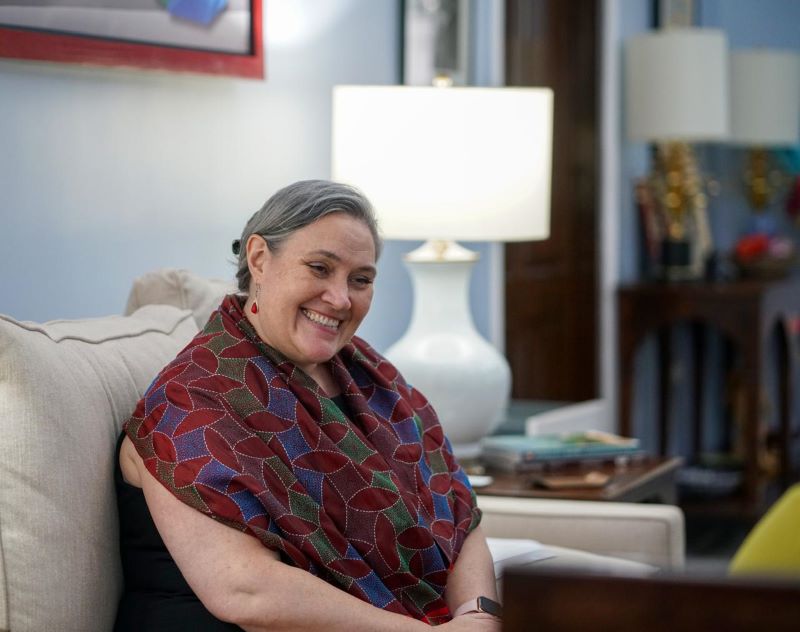 "But one of the weirdness of the Immigration Law has always been that in order to process the immigrant visa, one has to return to their home country or to another country and go through the immigration visa process, which takes time. " | Photo courtesy: U.S. Consulate General in Kolkata
"But one of the weirdness of the Immigration Law has always been that in order to process the immigrant visa, one has to return to their home country or to another country and go through the immigration visa process, which takes time. " | Photo courtesy: U.S. Consulate General in Kolkata
Q. What are the hits and misses for you if you analyse your own tenure?
A. We had a lot of hits, I would say. For more than a decade, we have worked on trying to raise awareness on human trafficking and how it hurts population and people and how bad it is, so one of our hits was actually taking the programme here in our states to other parts of India and all the way to New Delhi, where we had the first National Conclave on human trafficking. Representatives from the central governments and all the states came to talk about ways to communicate more effectively across state boundaries in order to make sure that both domestic and international human trafficking victims are treated with respect, that their wishes are understood, that they are restored to a place where they can live with dignity.
It was really an honour to work with Kailash Satyarthi and have him here in Kolkata just to hear some of the stories that he has gathered from children who have been in these situations which were heartbreaking but help people to change. So we have to raise those stories so that people would understand that it's not just an economic reality but also a human reality that needs to change.
I won't say we have had misses but I still think there are still some of the works that we are doing which are going to grow. We have been working on anti-human trafficking for more than a decade. We start planting seeds and then the seeds of relationships and ideas grow and then over time, they will grow into something that we are trying to achieve. I think some of the seeds I have tried to plant are related to inclusion and accessibility. Some of the areas are working on down syndrome, mental health of people post pandemic to list a few.
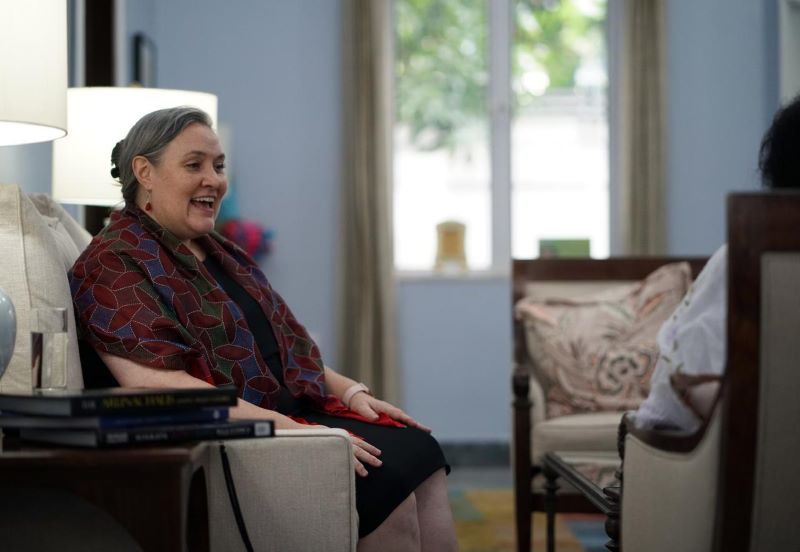 "Indian parents want what is best for their children. They want to be able to invest in their children and know that their children are gonna get the best education they can get. " | Photo courtesy: U.S. Consulate General in Kolkata
"Indian parents want what is best for their children. They want to be able to invest in their children and know that their children are gonna get the best education they can get. " | Photo courtesy: U.S. Consulate General in Kolkata
Q. You visited IIM Shillong recently. How was it? If you can elaborate on that tour.
A. I have actually been to IIM Shillong twice. The first time I was in Shillong, I visited a couple of other universities. We ended up at IIM Shillong but just for a short period of time. I had a chance to meet the Director of the institution there and he encouraged me to go back. He asked me to visit IIM Shillong for a longer programme next time. I was doing more educational outreach at IIM Shillong the last time I went.
Q. Why do you think Indian students are migrating to the U.S. in large numbers in recent years as compared to previous decades?
A. I think the numbers are bigger. Last year, we issued 140,000 student visas and that meant there were about 270,000 Indian students in the United States last year. This year, we are on track to probably do a comparable number or may be even more. I have not done the analytics on this but it would be an interesting research to compare the number of Indian students moved to the U.S. in the 1960s, 1970s or 1980s, per-capita based on the population of the middle class.
I think one of the reasons behind the increase in the numbers is simply the Indian middle class is growing and there is not enough space in India's higher educational institutions to educate all of the Indians who are seeking an education. Indian parents want what is best for their children.
They want to be able to invest in their children and know that their children are gonna get the best education they can get. Therefore, they are looking for the best investment they can make if they are unable to get that education locally. And the U.S. education is incredibly well renowned for not only giving a great education but also giving opportunities to do either one or three years of optional practical training after the degree is finished. So I think it's not only one who is getting a very practical high quality degree but also an opportunity to prove one's skills in very high quality companies and then if one chooses to come back to India, his/her resume is even stronger.
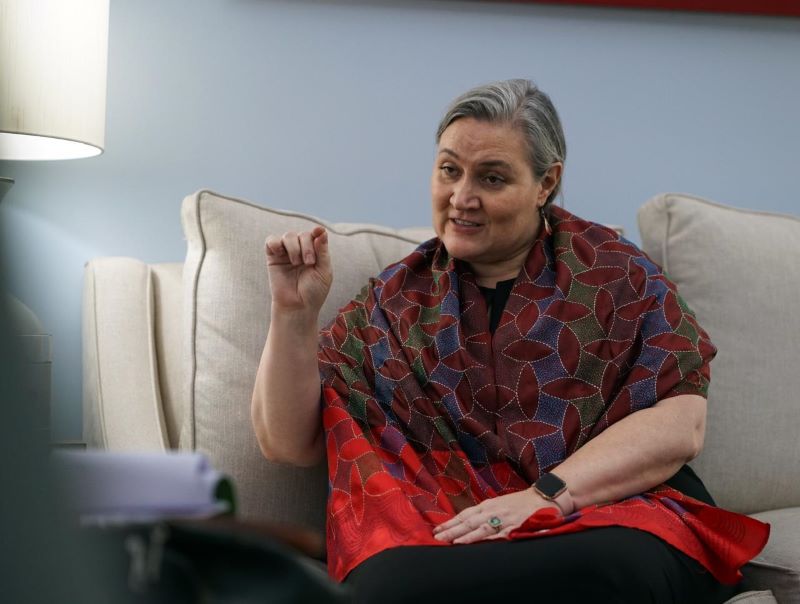 "It was really an honour to work with Kailash Satyarthi and have him here in Kolkata just to hear some of the stories that he has gathered from children who have been in these situations which were heartbreaking but help people to change." | Photo courtesy: U.S. Consulate General in Kolkata
"It was really an honour to work with Kailash Satyarthi and have him here in Kolkata just to hear some of the stories that he has gathered from children who have been in these situations which were heartbreaking but help people to change." | Photo courtesy: U.S. Consulate General in Kolkata
Even if one chooses to stay in the United States, one will have time to make a reputation in a company and then have the opportunity to get an H-1B visa and other types of visa that allows one to stay as an employee. So I think in some ways, it's a win-win situation. However, there is a huge number of Indian diaspora from the United States who are coming back to Kolkata. It has got a lot to do with the awareness during the pandemic period. Folks, who have been in the United States, recognise they want to spend time with their family. So they have built their resumes, recognised the strength of the Indian economy and they are coming back to start their own company, or do consulting or build family businesses or other things. I think that's actually a really interesting story as well. It's not just a one-way trip but very much a constant flow of people back and forth which I think is really good for the long term stability and strengthening of our relationship.
Q. You have raised concern over students mortgaging land and house to study in the U.S. Do you think this trend is on the rise?
A. I said that as an example and partly as a cautionary tale. It is because we too hear stories of students whose parents are pulling together every money they can come up with in order to send their children for a better opportunity and a future. And I think it is really admirable but one has to recognise that the value of an education comes with its completion. If the family is able to come up with the money for one year but not the full programme, unfortunately it's not a positive thing. They won't end up with that degree. The value of the programme comes upon getting the degree. So that's what I was trying to emphasise.
I think the U.S. education is a wonderful opportunity but students and parents have to be realistic about the costs involved and need to look at the whole range of schools. There are a lot of students and parents who only look at the top schools but the reality is, there are more than 4,000 U.S. institutions of higher education and everywhere there are community colleges which are very reasonably priced for two years to get an associate degree and then maybe get into a university at a cheaper price point and still have a really great education. One of the things that I was trying to emphasise is that there is no 'one size fits all'.
And the U.S.-India education foundation exists specifically so that students and their parents can go and get advice.
We have a lot of students in the United States who do degrees, have students' loans that they come out with and they find those loans can be a little overwhelming once they graduate. So I think students of today really need to think about what is the investment they are making and the return they are hoping to get.
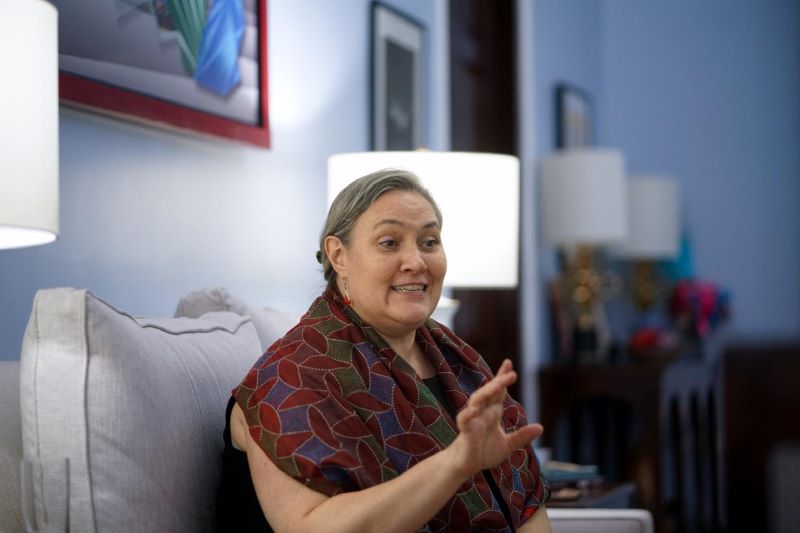 "I think the U.S. education is a wonderful opportunity but students and parents have to be realistic about the costs involved and need to look at the whole range of schools." | Photo courtesy: U.S. Consulate General in Kolkata
"I think the U.S. education is a wonderful opportunity but students and parents have to be realistic about the costs involved and need to look at the whole range of schools." | Photo courtesy: U.S. Consulate General in Kolkata
Q. India has returned to the coalition format of government in 2024. How do you see this will impact the bilateral relationship between India and the U.S.? Also the U.S. delegation's unprecedented meeting with the Dalai Lama happened.
A. The U.S.-India bilateral relationship is robust, multi-faceted, respectful and getting stronger. So I think like any bilateral relationship, domestic politics plays a role in some of the messaging that happens, may be domestically by the individual governments, but when it comes to international relations, the most important thing is the shared foreign policy goals. India and the U.S. are both democracies, so the rule of law, free and open Indo-Pacific, all of those topics are not only talking points by one U.S. political party but both because they are part of our values, governments and at the same time, India has a coalition government that has the same values.
Now what happens domestically and which domestic policy might move forward is going to be interesting to watch on both sides but when it comes to our shared foreign policy interests, those don't change based on domestic elections or even leadership. They change based on the assessment of what are the threats, opportunities and what are the pacts the two countries can bring together.
Q. How do you see the Biden government's declaration of steps to address the pleas of certain non-citizens' spouses who seek to attain lawful residency in the U.S. without leaving the country?
A. It is interesting because one of the biggest driving forces behind the U.S. Immigration Policy, as long as I have known it, is all about family reunification and so of course that's one of the things that there is no cap in the number of family members in certain categories that can immigrate to the United States as a spouse or a child under a certain age and because that's all about family reunification. We value the importance of family and being able to be near each other.
But one of the weirdness of the Immigration Law has always been that in order to process the immigrant visa, one has to return to their home country or to another country and go through the immigration visa process, which takes time. So I think this seems a really smart approach to maintaining family unification. It also reflects the fact that the U.S. Immigration Law allows for an unlimited number of people who are spouses or children under a certain age to immigrate to the United States. It'll be really interesting to see how it just logistically works. Since it's relatively a new announcement, I think it'll be very interesting to see what are the requirements in order to qualify. It's important.
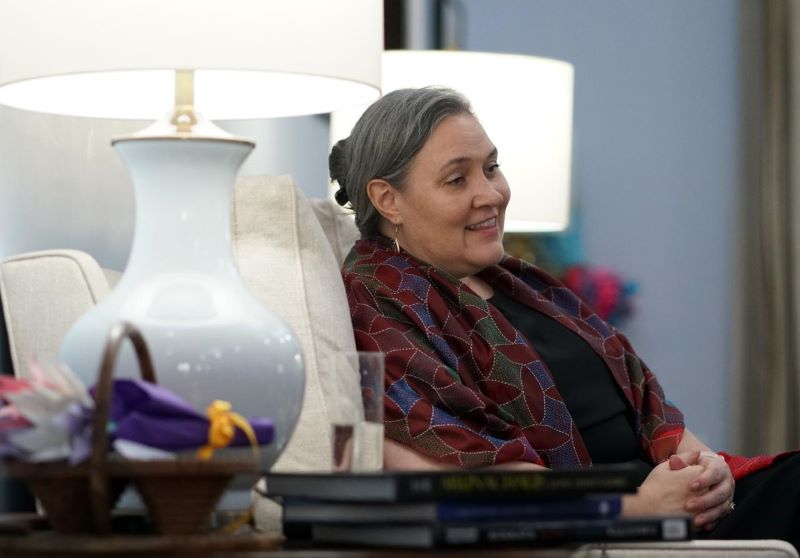 "Even if one chooses to stay in the United States, one will have time to make a reputation in a company and then have the opportunity to get an H-1B visa and other types of visa that allows one to stay as an employee. So I think in some ways, it's a win-win situation." | Photo courtesy: U.S. Consulate General in Kolkata
"Even if one chooses to stay in the United States, one will have time to make a reputation in a company and then have the opportunity to get an H-1B visa and other types of visa that allows one to stay as an employee. So I think in some ways, it's a win-win situation." | Photo courtesy: U.S. Consulate General in Kolkata
Q. What are the areas you would suggest your successor to focus on immediately?
A. One of the things is the Integrated Country Strategy that has high level themes within which we have the opportunity to shape our directions. One of the things my team and I have tried to do is understand what kind of programmes are helpful in our district and supporting those. I have emphasised combating climate change which I think will continue to be a critically important topic, women's entrepreneurship and entrepreneurship in general, importance of English language education specifically to groups that may not have access to any sort of educational curriculum in English.
I think my successor, who also comes from teaching English as a second language background, shall probably share some topics there. I am going to be giving her some tips but ultimately she will also be focussing on the programmes or topics that she really finds important. She is currently serving at the U.S. mission to NATO in a public affairs officer's position, so she has some very different experiences and backgrounds than I do. So it would be really interesting to see how she brings some of the experiences that she has had in the defence partnerships.
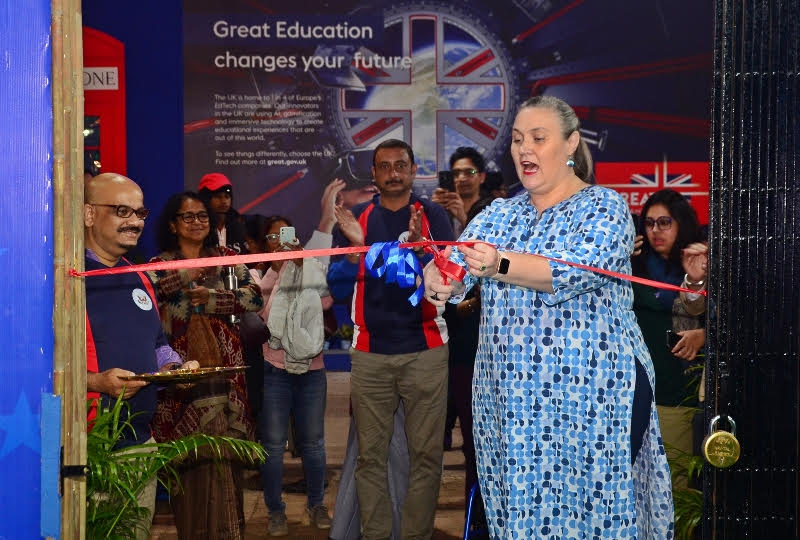 "I think the warmth of people whom I have known in Kolkata, the opportunity to do so many addas (chat) about different topics, ideas, the chance to observe and really learn from different forms of arts, music, dance, culture, history. " | Malinda Pavek at International Kolkata Book Fair in 2024 | Photo courtesy: IBNS File
"I think the warmth of people whom I have known in Kolkata, the opportunity to do so many addas (chat) about different topics, ideas, the chance to observe and really learn from different forms of arts, music, dance, culture, history. " | Malinda Pavek at International Kolkata Book Fair in 2024 | Photo courtesy: IBNS File
Q. What memories are you taking back from India?
A. There are so many memories I am taking back from India. I have been reflecting on them over the last couple of weeks. I think the warmth of people whom I have known in Kolkata, the opportunity to do so many addas (chat) about different topics, ideas, the chance to observe and really learn from different forms of arts, music, dance, culture, history. I think it all comes back to one thing, which is people. People-to-people ties are what make bilateral relationships between countries work. I will definitely be taking with me the warm hugs, be it verbal or physical or social media, of the people I have had the chance to meet once or multiple times or become deep friends with. It has really made being here very special.
(Images: U.S. Consulate General in Kolkata, IBNS File)
Support Our Journalism
We cannot do without you.. your contribution supports unbiased journalism
IBNS is not driven by any ism- not wokeism, not racism, not skewed secularism, not hyper right-wing or left liberal ideals, nor by any hardline religious beliefs or hyper nationalism. We want to serve you good old objective news, as they are. We do not judge or preach. We let people decide for themselves. We only try to present factual and well-sourced news.





